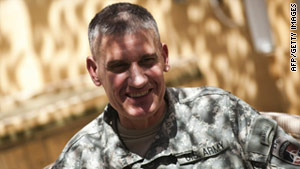Scammer
Banned

-- A recent lull in Taliban resistance will not last, says a top commander who adds that come spring, the insurgents will be back on the offensive in Afghanistan, perhaps with assassination teams.
Despite the dismal prediction by the number-two American commander in Afghanistan, Lt. Gen. David Rodriguez painted a positive picture of American and international war efforts there, but warned the Taliban will be back on the offensive when spring arrives.
Winter in Afghanistan is so brutal, the Taliban tend to hunker down and refit so they can launch offensives in the spring.
Rodriguez expects the Taliban, which was hit hard by an increase in coalition attacks in 2010, to try new tactics this spring in an effort to rollback coalition military gains.
"Yes, assassination hit teams, IEDs (improvised explosive devices, or roadside bombs), indirect things. They will not be as direct in their confrontations as they were last year, I believe," Rodriguez told journalists at a press conference Tuesday.
The general expects Taliban hit teams to target civilian leaders who have taken over in areas that the Taliban used to control before coalition offensive operations.
But it's not just those who oppose the Taliban that are being killed.
"They're killing their own," Rodriguez said. "You've got to understand that, in that insurgency, there's a hierarchy of the most committed to the least committed. And they have been going after the people who were part of their efforts before, but who are on the lower scale, who are trying to turn over and support their government."
The Taliban's tactic of turning on their own comes after coalition success in places like Kabul, the capital.
"There were very few spectacular attacks in 2010. In fact, we went almost seven months without one, which is the longest on record in the last several years," Rodriguez said of Kabul.
The troops, including Afghan National Army forces, are doing a much better job of finding caches of weapons that the Taliban relied on, Rodriguez observed. In In the last 12 weeks, troops found and destroyed 1,250 caches, in the same period a year ago they found only 163 caches.
Those gains have come at a cost, as 2010 was the deadliest year of the war so far for U.S. troops. Nearly 500 troops were killed; another 25 troops were killed in January of this year.
As for the July 2011 deadline to start withdrawing U.S. forces from Afghanistan, Rodriguez hinted that Herat, in the west, might be one place to start. Herat, he said is "largely free from violent incidents and ready to transition to Afghan lead very soon."
Rodriguez also addressed the issue of militants hiding in Pakistani safe haven. He said that it would help if Pakistan could go after those insurgents in North Waziristan, but even if that doesn't happen, it doesn't mean "mission failure" of the U.S. effort in Afghanistan.
In spite of what he sees as many successes against the insurgents, Rodriguez said "the Taliban's not on the ropes yet."
